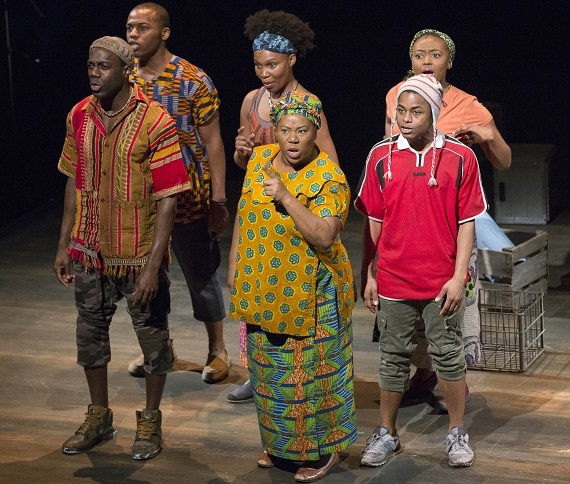Witness Uganda

(© Gretjen Helene Photography)
Uganda threatens to join Oklahoma and Brigadoon as a favored musical-theater destination. First there was The Book of Mormon, which bathed both struggling Africans and the Latter-day Saints marching in to save them in naughty, snarky South Park colors. Witness Uganda, also about aid workers in Africa, is an antidote to that taste-bashing, Tony-winning moneymaker. The rousing autobiographical show by Matt Gould and Griffin Matthews, currently in its world premiere at American Repertory Theater, is based on Matthews’ own experience: In 2005, fed up with pounding the pavements as a young actor and with a church that rejected him because he was gay, he went to Uganda to volunteer for a charity that turned out to be a sham. He didn’t find the Ugandan Christians more receptive to homosexuality than the bigots back home, but he did befriend 10 teenage orphans with no access to education, which in Uganda costs money. He has since supported them to the tune of $50,000 a year and considers them family. Witness Uganda, written with composer partner Gould (who had served in the Peace Corps in Mauritania), began life as a sort of infomercial for the pair’s charity, Project Uganda. Along the way, it won the 2012 Richard Rodgers Award for Musical Theater and landed on the desk of Tony-winning ART artistic director Diane Paulus, who helms the heartfelt, exuberant production in which Matthews plays himself and Gould, pounding the keyboards, shooting his arms up, and singing along, leads the band.
Sounds like an inspirational fairy tale, right? Well, not exactly. Succumbing to what Paulus calls "the American impulse to help in the world," Matthews experienced satisfactions and also some sucker punches, most of which find their way into this deeply personal primer on how complicated it is to be a Samaritan. Certainly the show stretches the limits of what you can make a musical out of — there are times when it veers dangerously close to "What I Did on My Summer Vacation While Finding and Accepting Myself." And the show’s African elements are more compelling than its American ones (which include some sappy pop ballads). But Paulus’ fluid production makes the most of the disparity, streaming evocative landscape projections (designed by Peter Nigrini) across traveling mosquito-netting scrims and metal-lattice panels and deploying a lithe ensemble that regularly bursts onto and around the stage to rock muscular dances by Darrell Grand Moultrie, which draw on African tradition and Alvin Ailey. Like Matthews, traveling between New York and his village near Kampala, the staging is always on the move.
Following a video flash-forward and an ecstatic musical prologue, the wry Matthews lays out the premise: "My name is Griffin, and this is my story." We see him in Brooklyn, trying to convince gal pal Ryan to accompany him to Africa, where he arrives as a volunteer, only to learn that the never-seen "Pastor Jim" is running a charity whose sole beneficiary is himself. So instead of building schools that are really just real estate, Griffin resolves to teach a rakish quartet of street kids who are at first more interested in the free sodas he dispenses than in the self-empowerment lessons that go with them. Griffin develops a special attachment to Pastor Jim’s errand and whipping boy, Jacob, whose sister, the inaccurately named Joy, embodies the hardened distrust inculcated by seeing too many aid workers come and go. These two will ultimately teach Griffin a heartbreakingly tough life lesson. The orphans, too, will make demands that, once back in the states, are hard — if gratifying — to meet.
But the core of Witness Uganda is its score, awash in African rhythms, now joyous, now ominous and angry. And the songs are well delivered by a powerful ensemble whose vocal anchor is the commanding Melody Betts, as persuasive when booming gospel as African chant. Matthews himself is possessed of a pleasing tenor, and Nicolette Robinson, among the orphans, boasts the clearest, prettiest pipes. Adeola Role is a forceful, contained Joy, Michael Luwoye an ingenuous Jacob. He’s not what Griffin thinks he is, but sometimes out of disillusion comes hope — or a hopeful musical.











